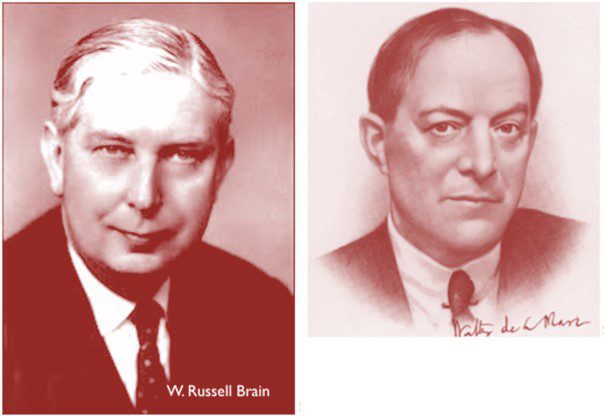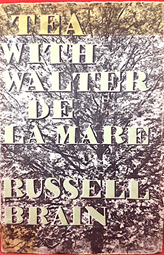JMS Pearce
Hull, England

“The little nowhere of the brain”
Many physicians have dabbled in literature and the arts, or as “medical truants” have abandoned medicine for such ventures. A unique collaboration of medicine and literature was the friendship and exchange of diverse stories and speculative ideas of human experience between the eminent neurologist Walter Russell Brain DM FRCP FRS (1895–1966) and the author Walter John de la Mare OM CH (1873–1956).
How did their friendship begin? Russell Brain discovered an odd phrase used by Walter de la Mare: the little nowhere of the brain. This fascinated Brain, who wrote to him to ask its source. De la Mare replied that it was in his essay on Rupert Brooke, and a lasting correspondence ensued. In 1951, de la Mare invited Brain to tea. Until de la Mare’s death in 1956, Brain frequently visited him, and over tea they would “tea talk” to consider esoteric and especially exoteric subjects and recount stories of their experiences, ideas, and conjectures.
The many medical accomplishments of the aptronymic Russell Brain, leading to his appointment as Baron Brain of Eynsham, are well documented.1,2 He was also an accomplished poet. He published many texts and gave several lectures and addresses on perception, the nature of experience, genius, speech, and consciousness. A shy, quiet, but kindly man, his great learning and erudition were often concealed by his renowned and sometimes disconcerting dislike of small talk. His collaboration with de la Mare exercised his intellect beyond medicine to embrace poetry, literary works, and the nature of mind-body interplay.
Walter de la Mare (known as Jack or WJ) was highly esteemed as a prolific poet, short story writer, and novelist.3 He was celebrated for his romantic tales and fantasies, which often focused on dreams, the supernatural, and perhaps above all, on his conceits of childhood as a time of intuition, emotion, and closeness to spiritual truth. He remarked: “I know well that only the rarest kind of best can be good enough for the young.” His poem “The Listeners”, the short story “The Riddle”, and his essay “Memoirs of a Midget”are amongst his better-known works.
Brain was deeply impressed by the imaginative charm and erudition of de la Mare’s conversations. On returning home, he would make notes after each visit. Tea with Walter de la Mare, published by Faber and Faber in 1957, one year after de la Mare’s death, is a record of those meetings. Though now forgotten, these fascinating exchanges of unusual notions and questions about human experience have not paled.

The protean topics and ideas ranged from imaginative and often amusing anecdotes about daily experiences to deeply philosophical dilemmas. De la Mare was a fine storyteller. He was preoccupied with childhood fantasies, memory, the occult nature of reality, and how human perception might affect mind-body relationships and consciousness: “All day long the door of the sub-conscious remains just ajar; we slip through to the other side, and return again, as easily and secretly as a cat.” For instance, he wondered how one could distinguish between reality and a dream: what he experienced in “so-to-speak reality” was “waking experience,” and “dream” was “sleeping experience,” which was just as real as his “waking experience.” In “The Listeners”, the strange, ghostly aspect of de la Mare’s ideas are shown:
But only a host of phantom listeners
That dwelt in the lone house then
Stood listening in the quiet of the moonlight
To that voice from the world of men
Brain relates how, for de la Mare, childhood was a state of pure wonder, intuition, and fantasy; children could see this world as part of another, no less real for being magical and spiritual: “I know well that only the rarest kind of best can be good enough for the young.”There was a hidden and neglected essential truth in the innocent, unspoiled notions of early childhood. Their talks questioned how abstract thought and meanings were transferred into words, where appearance and arrangement altered the meaning by the powers of alliteration and repetition.
I shall cite just one example to show de la Mare’s originality and unbounded curiosity. He closely examines his budgerigar and says to Brain:
He has a very Gladstonian look. He never seems to look at you with more than one eye—his blackberry sphere of an eye… Does he suppress what he sees with the other? You never look at a person between the eyes, or if you do he notices it at once. Isn’t it remarkable that you can always tell to a minute degree what another person is doing with his eyes!
Both men posed fascinating questions, which most of us would never think of. “How do you visualise yourself? Do you ever picture your own back? Do you ever try to stop thinking—it’s like trying to dam a kind of torrid stream. If you were asked to prove you were sane how would you do it?”
In his 1919 lecture “Rupert Brooke and the Intellectual Imagination” at Rugby School, de la Mare tellingly observes:
Illumined by the imagination, our life—whatever its defeats and despairs—is a never-ending, unforeseen strangeness and adventure and mystery. This is the fountain of our faith and of our hope.
This commendation of a book of yesteryear may be deemed nostalgia—an essentially harmless and often wistfully pleasurable yearning for home or past memories and experiences. Yet in Tea with Walter de la Mare, through conversations and anecdotes, Lord Brain gently guides us along a forward-looking path through which we can better understand and learn from two very different but scintillatingly original minds.
References
- Pickering, GW. Biography: Brain, W. Russell, 1895-1966. In: Biographical Memoirs of Fellows of the Royal Society, vol. 14, November 1968.
- Pearce JMS. Walter Russell Brain DM FRCP FRS (1895–1966). Hektoen International, Fall 2020.
- Willison IR, ed. Walter John De La Mare. The New Cambridge Bibliography of English Literature 1972; 4: 1900–1950. Cambridge University Press.
JMS PEARCE is a retired neurologist and author with a particular interest in the history of medicine and science.

Leave a Reply